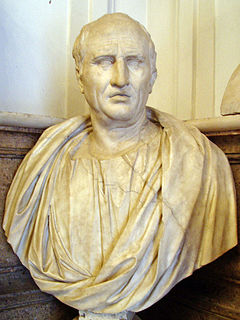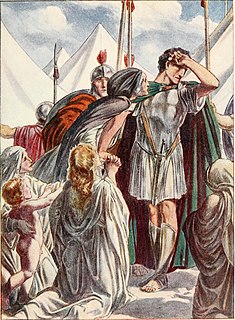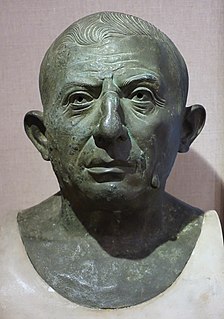Related Research Articles

The gens Furia, originally written Fusia, and sometimes found as Fouria on coins, was one of the most ancient and noble patrician houses at Rome. Its members held the highest offices of the state throughout the period of the Roman Republic. The first of the Furii to attain the consulship was Sextus Furius in 488 BC.

The gens Lucilia was a plebeian family at ancient Rome. The most famous member of this gens was the poet Gaius Lucilius, who flourished during the latter part of the second century BC. Although many Lucilii appear in Roman history, the only one known to have obtained any of the higher offices of the Roman state was Lucilius Longus, consul suffectus in AD 7.

Publius Cornelius Scipio Africanus Aemilianus, primarily known as Scipio Aemilianus, also known as Scipio Africanus the Younger, was a Roman general and statesman noted for his military exploits in the Third Punic War against Carthage and during the Numantine War in Spain. He oversaw the final defeat and destruction of the city of Carthage. He was a prominent patron of writers and philosophers, the most famous of whom was the Greek historian Polybius. In politics, he opposed the populist reform program of his murdered brother-in-law, Tiberius Gracchus.
The gens Pontia was a plebeian family at ancient Rome. Few members of this gens rose to prominence in the time of the Republic, but the Pontii flourished under the Empire, eventually attaining the consulship. Pontius Pilatus, as prefect of Judaea, is known for his role in the execution of Jesus.

De re publica is a dialogue on Roman politics by Cicero, written in six books between 54 and 51 BC. The work does not survive in a complete state, and large parts are missing. The surviving sections derive from excerpts preserved in later works and from an incomplete palimpsest uncovered in 1819. Cicero uses the work to explain Roman constitutional theory. Written in imitation of Plato’s Republic, it takes the form of a Socratic dialogue in which Scipio Aemilianus takes the role of a wise old man.

The gens Pompeia was a plebeian family at ancient Rome, first appearing in history during the second century BC, and frequently occupying the highest offices of the Roman state from then until imperial times. The first of the Pompeii to obtain the consulship was Quintus Pompeius in 141 BC, but by far the most illustrious of the gens was Gnaeus Pompeius, surnamed Magnus, a distinguished general under the dictator Sulla, who became a member of the First Triumvirate, together with Caesar and Crassus. After the death of Crassus, the rivalry between Caesar and Pompeius led to the Civil War, one of the defining events of the final years of the Roman Republic.
Publius Mucius Scaevola was a prominent Roman politician and jurist who was consul in 133 BC. In his earlier political career he served as tribune of the plebs in 141 BC and praetor in 136 BC. He also held the position of pontifex maximus for sixteen years after his consulship. He died around 115 BC.

The gens Cornelia was one of the greatest patrician houses at ancient Rome. For more than seven hundred years, from the early decades of the Republic to the third century AD, the Cornelii produced more eminent statesmen and generals than any other gens. At least seventy-five consuls under the Republic were members of this family, beginning with Servius Cornelius Maluginensis in 485 BC. Together with the Aemilii, Claudii, Fabii, Manlii, and Valerii, the Cornelii were almost certainly numbered among the gentes maiores, the most important and powerful families of Rome, who for centuries dominated the Republican magistracies. All of the major branches of the Cornelian gens were patrician, but there were also plebeian Cornelii, at least some of whom were descended from freedmen.

The gens Marcia, occasionally written Martia, was one of the oldest and noblest houses at ancient Rome. They claimed descent from the second and fourth Roman Kings, and the first of the Marcii appearing in the history of the Republic would seem to have been patrician; but all of the families of the Marcii known in the later Republic were plebeian. The first to obtain the consulship was Gaius Marcius Rutilus in 357 BC, only a few years after the passage of the lex Licinia Sextia opened this office to the plebeians.

The Numantine War was the last conflict of the Celtiberian Wars fought by the Romans to subdue those people along the Ebro. It was a twenty-year conflict between the Celtiberian tribes of Hispania Citerior and the Roman government. It began in 154 BC as a revolt of the Celtiberians of Numantia on the Douro. The first phase of the war ended in 151, but in 143, war flared up again with a new insurrection in Numantia.

Quintus Caecilius Metellus Pius Scipio, often referred to as Metellus Scipio, was a Roman senator and military commander. During the civil war between Julius Caesar and the senatorial faction led by Pompey, he was a staunch supporter of the latter. He led troops against Caesar's forces, mainly in the battles of Pharsalus and Thapsus, where he was defeated. He later committed suicide. Ronald Syme called him "the last Scipio of any consequence in Roman history."
Gaius Hostilius Mancinus was a Roman consul in 137 BC. Due to his campaign against Numantia in northern Spain, Plutarch called him "not bad as a man, but most unfortunate of the Romans as a general." During this campaign in the Numantine War, Mancinus was defeated, showing some cowardice, allegedly putting out his fires and trying to flee by night before being surrounded and forced to make peace. According to Plutarch, Tiberius Gracchus was instrumental in bringing about the peace and saving 20,000 Roman soldiers. He returned home something of a hero, but Mancinus was put on trial by the senate, which refused to accept the treaty. While Gracchus and other lieutenants were saved by Scipio Aemilianus, the senate decreed that Mancinus be handed over to the Numantines, as some 20 Roman commanders were handed over to the Samnites after the defeat at the Caudine Forks in 321 BC. Plutarch does not relate Mancinus' further fate, but Appian noted that he was taken to Spain and handed over naked to the Numantines, but that they refused to accept him. He seems to have returned to Rome, where he took his seat in the senate, but in the following year, Publius Rutilius, one of the tribunes of the plebs, ordered him to vacate it, on the ground that when he had been surrendered to the Numantines, he had lost his Roman citizenship.
Marcus Aemilius Lepidus Porcina was a member of the important Roman gens Aemilia, consul of the Roman Republic in 137 BC.

The gens Caecilia was a plebeian family at ancient Rome. Members of this gens are mentioned in history as early as the fifth century BC, but the first of the Caecilii who obtained the consulship was Lucius Caecilius Metellus Denter, in 284 BC. The Caecilii Metelli were one of the most powerful families of the late Republic, from the decades before the First Punic War down to the time of Augustus.

The gens Hostilia was an ancient family at Rome, which traced its origin to the time of Romulus. The most famous member of the gens was Tullus Hostilius, the third King of Rome; however, all of the Hostilii known from the time of the Republic were plebeians. Several of the Hostilii were distinguished during the Punic Wars. The first of the family to obtain the consulship was Aulus Hostilius Mancinus in 170 BC.
The gens Fannia was a plebeian family at ancient Rome, which first appears in history during the second century BC. The first member of this gens to attain the consulship was Gaius Fannius Strabo, in 161 BC.
The Scipionic Circle, or the Circle of Scipio, was a group of philosophers, poets, and politicians patronized by their namesake, Scipio Aemilianus. Together they would discuss Greek culture, literature, and humanism. Alongside their philhellenic disposition, the group also had a more humane Roman foreign policy. The term was first derived during the 19th century and ubiquitously adopted by scholars of the early 20th century. The collection of members varied during its existence, from 15 names of the early period, to 27 in its middle to 10 in its final.
The gens Laelia was a plebeian family at Rome. The first of the gens to obtain the consulship was Gaius Laelius in 190 BC.
The gens Manilia was a plebeian family at ancient Rome. Members of this gens are frequently confused with the Manlii, Mallii, and Mamilii. Several of the Manilii were distinguished in the service of the Republic, with Manius Manilius obtaining the consulship in 149 BC; but the family itself remained small and relatively unimportant.
The gens Mummia was a plebeian family at Rome. Members of this gens are first mentioned after the Second Punic War, and within a generation, Lucius Mummius Achaicus became the first of the family to obtain the consulship. Although they were never numerous, Mummii continued to fill the highest offices of the state through the third century AD.
References
- Cicero, de Republica
- Cassius Dio, Roman History
- Rawson, Elizabeth (1973) Scipio, Laelius, Furius and the Ancestral Religion, The Journal of Roman Studies, Vol. 63, pp. 161–174